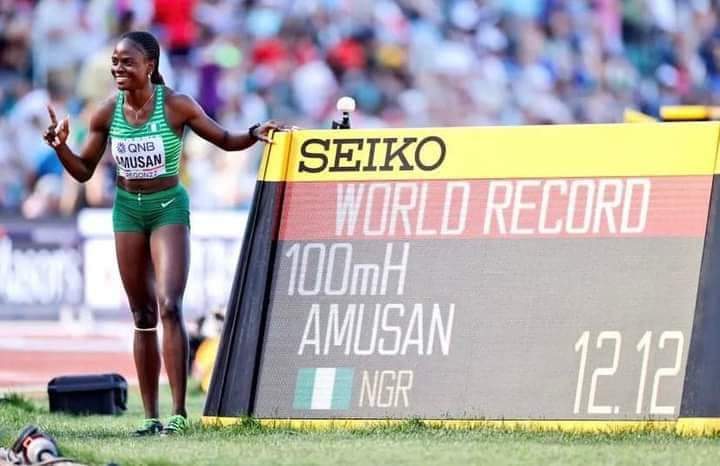My Concerns About The Tobi Amusan Case
SIMBO OLORUNFEMI

I wish I could just brush aside the situation in which our Tobi Amusan is currently enmeshed in, like many others have, confident that in a matter of weeks, it will all blow over and Tobi will be back to racing soon.
Unfortunately, while praying that would be the case, having now taken time to interrogate ‘similar’ cases (not hers) and the slippery terrain upon which the precedent rests, I am now quite concerned. I can only pray that Tobi gets a pass.
And if she does, then she would have to conduct a review of what might have occasioned this lapse and take on board serious lessons from what, at best, could have only come from serial negligence or carelessness on her part or those around her, as I doubt that ignorance could have been responsible.
Here is what we are dealing with:
As reported by Tobi herself, she has been charged by the Athletics Integrity Unit of violating the rules, having missed 3 consecutive tests in 12 months. Now, these are out-of-competition tests.
But I initially did not have any apprehension, feeding off her positive energy and faith that this will be resolved in her favour at arbitration. I would be jolted, however, when I saw the news days after that the Swedish Tennis player, Mikael Ymer, ranked 51 in the world has been hit with a 18-month ban on an anti-doping rules violation for for missing three out-of-competition drug tests during a 12-month period.
“I do not believe I broke those rules, and my conscience is clear with God as my witness,” Mikael says. He had never failed a drug test and was not accused of using any Performance Enhancing Drug.
Having initially been victorious at Arbitration, things turned sour upon appeal filed by ITF at the Court of Arbitration for Sport, which said in a statement that Ymer “failed in ensuring his compliance” with the whereabouts rule and found that the “degree of fault of the player, a professional and experienced athlete, was high, although the third whereabouts failure could be described as the result of culpable negligence.”
The fact that Mikael disputed the circumstances surrounding the 3rd missed doping test did not count at CAS, he was slammed with an 18-month ban.
His would neither be the first nor the last. Only a few weeks back, another Tennis player, Jenson Brooksby announced he had accepted a 6-month provisional suspension for allegedly missing 3 doping tests, even though he planned to appeal the decision.
What is this all about? Who is AIU, in the first place? How is it that these Sportspeople keep missing these tests? What is really at stake? Why this strict enforcement of punishment? What could this possibly mean for Tobi?
AIU
World Athletics established the Athletics Integrity Unit (“AIU”) whose role is to protect the integrity of the sport of Athletics, including fulfilling World Athletics’ obligations as a signatory to the World Anti-Doping Code (‘the “Code”). World Athletics has delegated
implementation of the World Athletics Anti-Doping Rules (“ADR”) to the AIU, including but
not limited to the following activities in relation to International-Level Athletes: Testing,
Investigations, Results Management, Hearings, Sanctions and Appeals.
There are different infractions and violations, which Athletes can be charged for. In the case of Tobi, like the 2 Tennis players, it is for “Whereabouts Failure”, a breach of Article 2(4).
According to the AIU, “A WHEREABOUTS FAILURE WILL BE RECORDED AGAINST AN ATHLETE ON THE WORLD ATHLETICS RTP UNDER THE FOLLOWING CIRCUMSTANCES:
You have failed to submit your whereabouts by the required deadline (Filing Failure).
You have failed to update your whereabouts or you have not updated them as soon as possible after a change of circumstances (Filing Failure).
You have filed your whereabouts on time but they are incomplete or inaccurate or insufficient to enable us to locate you for testing (training address missing, home address too vague, competition schedule missing or incomplete, no address of temporary accommodation during competition…) (Filing Failure).
The Athletics Integrity Unit finds out that your whereabouts are inaccurate or incomplete following an unsuccessful attempt to test you (e.g. an athlete lives in a gated complex and fails to give instructions to the security gate to let the doping control officer in) (Filing Failure).
You have filed whereabouts information but you are not available for testing at the location corresponding to your 60-minute time slot (Missed Test).”
The summary is that an athlete is in violation of Rule 2.4 of the ADR “where he or she has any combination of three Missed Tests and/or Filing Failures within any twelve-month period, that period beginning on the day of the first relevant Missed Test/Filing Failure.” As can be seen, the onus is on the Athlete to ensure that relevant filing is done and/or access granted to enable conduct of test at designated times.
The question then is, what happens in case of a failure or mix-up at any point in time resulting in failure in filing or testing?
I reviewed the case of a Kenyan Athlete, Mathew Kipkoech Kisorio who was charged for “Whereabouts Failures” under Article 2.4 last year and found guilty. I saw the extended long rope extended by AIU before finally recording one failure, which is again repeated on the second and third occasion, before the Athlete is finally charged. To fall short 3 times consecutively within a year can, at best, only be as a result of negligence or carelessness.
In the case of Mathew Kipkoech Kisorio, for his “First Whereabouts Failure – Missed Test”, it was reported that “a Doping Control Officer and Blood Collection Assistant
attended the address indicated in the Athlete’s Whereabouts information for 16 February
2021 during the Athlete’s specified 60-minute time slot between 07:00 and 08:00 and a third
party informed the DCO that the Athlete was not present and that the Athlete had been away from that location for around two (2) months. The DCO remained at the Athlete’s specified location until 08:00, but the Athlete was not available for Testing.
Therefore, on 24 February 2021, the AIU wrote to the e-mail address provided in ADAMS as the Athlete’s e-mail address and notified the Athlete of an apparent Missed Test which occurred on 16 February 2021 and requested his explanation by no later than 10 March 2021. The AIU received no response or any explanation from the Athlete for the apparent Missed Test that occurred on 16 February 2021 by 10 March 2021.
On 29 March 2021, the AIU therefore wrote to the Athlete and confirmed the Missed Test on 16 February 2021. The Athlete was afforded the right to request an administrative review of that decision by no later than 12 April 2021 and advised that, if he failed to do so, the Missed Test would be considered as a Whereabouts Failure for the purposes of Rule 2.4 ADR.
No request for an administrative review was received by 12 April 2021.
Therefore, the AIU recorded a Whereabouts Failure (a Missed Test) against the Athlete effective 16 February 2021.”
Going by the steps, as detailed above, it can easily be seen how much effort is usually invested by the AIU into the process of establishing ‘Whereabouts Failure’, from the visit to the location, emails sent to the Athlete and the window provided for administrative review, with the Athlete only booked after all these steps have been exhausted.
The same process applies to the second Whereabouts Failure, as well as the third Whereabouts Failure, before the Athlete is then finally charged for “Whereabouts Failure”, having established that there had been either filing failure or missed test on the part of the Athlete 3 times consecutively within 12 months.
Having reviewed the decision in the case of Mathew Kipkoech Kisorio, reports in 2 other cases, I am led to suggest that the process laid out by AIU leading to charging an Athlete for whereabouts failure is quite elaborate, offering the Athlete multiple Windows to prevent it from culminating in a charge, as we have seen in Tobi’s case.
That might be the reason why AIU hardly fails to establish its charge at point of arbitration or on appeal.
It will be even more difficult for an elite athlete to explain away 3 failures within 12 months, except there is a mix-up somewhere, which just might be the case in this instance with Tobi Amusan. The statement she put out speaks to confidence on her part. I pray she is successful at Arbitration so she is able to compete at the World Athletics Championships starting less than 4 weeks from now. Going forward, she would have to shake up things around her to ensure an incident of this nature does not repeat itself.
Wishing Tobi well.











